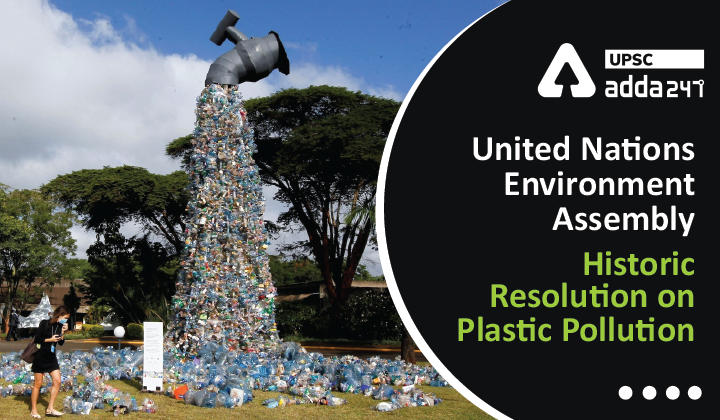Table of Contents
Beat Plastic aPollution: Relevance
- GS 3: Conservation, environmental pollution and degradation, environmental impact assessment.
Beat Plastic Pollution: Context
- Recently, 175 countries have adopted a historic resolution to end plastic pollution by creating an intergovernmental committee to finalise a legally binding agreement by 2024.
- Read about Extended Producer Responsibility, Plastic Waste Management Amendment Rules, 2021, and India Plastic Pact
Historic Resolution on Plastic Pollution Adopted: Key points
- The resumed session of fifth United Nations Environment Assembly (UNEA 5.2) was held from 28th February 2022 to 2nd March 2022 in Nairobi to strengthen actions for nature to achieve the Sustainable Development Goals.
- The meeting considered three draft resolutions to address plastic pollution.
- Importantly, one of the draft resolutions under consideration was that of India. The draft resolution submitted by India called for immediate collective voluntary action by countries.
- The resolution to form a legally binding agreement by 2024 was the most significant environmental multilateral deal since the Paris accord.
- The resolution establishes an Intergovernmental Negotiating Committee (INC), which will begin its work in 2022, with the ambition of completing a draft global legally binding agreement by the end of 2024.
- UNEP@50: It will be a high-level event, devoted to the commemoration of the 50th anniversary of the creation of the UN Environment Programme (UNEP) in 1972.
- UNEP@50 theme: Strengthening UNEP for the implementation of the environmental dimension of 2030 Agenda for Sustainable Development.

UNEP UPSC: Tri planetary crisis
- UNEP speak of a triple planetary crisis—the crisis of climate change; the crisis of biodiversity loss; and the crisis of pollution and waste. Together, they pose a huge threat to human peace and prosperity.
- Crisis of climate change: Concentrations of CO2 in the atmosphere are higher than two million years and one billion children are at extremely high risk from the impacts of climate change.
- Crisis of biodiversity loss: we continue to erode the natural world. Seventy-seven per cent of ice-free land surface has been modified by human activities and one million species face the threat of extinction.
- Crisis of pollution and waste: 11 million tonnes of plastic flows into our oceans every year and more than 90 per cent of us live in cities where air quality does not meet World Health Organisations standards.
- The triple planetary crisis has been caused by decades of relentless and unsustainable consumption.

UNEP Recommendations
- We must tackle the earth’s environmental emergencies and human well-being as one indivisible challenge.
- We must transform our economic and financial systems to power the shift to sustainability.
- We must transform our food, water and energy systems to meet growing human needs in an equitable, resilient and environmentally friendly manner.
Read current affairs for UPSC
| SWIFT Ban on Russia | Russia Ukraine War | SPARSH: System for Pension Administration | Fair and Remunerative Prices: Maharashtra Issues Resolution | Chernobyl Disaster: Russian Invasion, Causes and Consequences |
| EX DHARMA GUARDIAN-2022 | NBFC to Implement Core Financial Services Solution by 2025 | Sustainable Cities India Program | DEVAYATANAM | Conference on Indian Temple Architecture |
| Brick Kilns in India: MoEFCC Releases New Guidelines | Ex Cobra Warrior 22 | Draft Integrated Plant Nutrition Management Bill 2022 | National Strategy on Additive Manufacturing |
| MILAN 2022 | GOBAR DHAN Scheme: PM Inaugurates Asia’s Biggest Biogas Plant | Jal Jeevan Mission | Har Ghar Jal by 2024 | Annual Frontier Report 2022 |



 TSPSC Group 1 Question Paper 2024, Downl...
TSPSC Group 1 Question Paper 2024, Downl...
 TSPSC Group 1 Answer key 2024 Out, Downl...
TSPSC Group 1 Answer key 2024 Out, Downl...
 UPSC Prelims 2024 Question Paper, Downlo...
UPSC Prelims 2024 Question Paper, Downlo...




